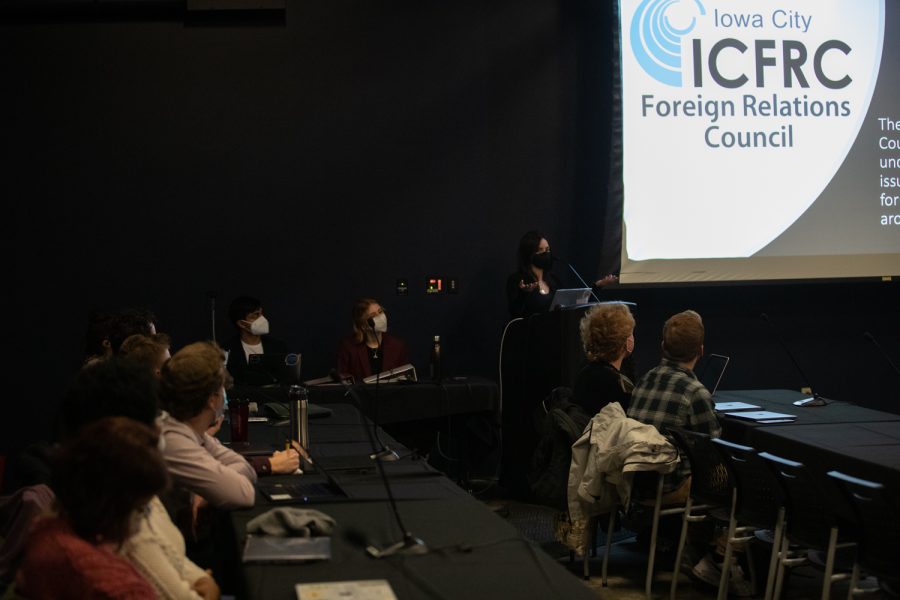USG amends constitution, looks to revitalize judicial branch
The Undergraduate Student Government passed an amendment Tuesday night altering the judicial appointment process in an effort to revive the judicial branch.
The University of Iowa Undergraduate Student Government listens to a representative from the Iowa City Foreign Relations Council speak during a USG meeting on Tuesday, Feb. 22, 2022.
February 22, 2022
The Undergraduate Student Government is attempting to fill more spots in its judicial branch, tasked with interpreting the organization’s constitution and bylaws and making judgements on parking tickets.
The organization’s constitution calls for seven student justices to serve on the organization’s judicial branch — currently, there are two students in judicial positions. USG plans to use an appointment process to ensure the branch remains full.
The organization passed a constitutional amendment on Tuesday to alter portions of the judicial branch rules to reestablish the prominence of the third branch.
The amendment, which passed unanimously, modifies the judicial appointment process by allowing the current USG president to appoint four of the seven members to the following year’s Student Judicial Court at the end of their term.
The final three members will be appointed to the court at the beginning of the new president’s term in the fall. The court will consist of a chief justice, student election commissioner and their deputy, and four general members.
Benton Renaud, USG internal affairs committee chair, drafted and introduced the legislation. He said it will provide one-year terms for all seven members.
He said some of the format for the judicial system was taken from the Supreme Court and the decision to split the nomination process between two administrations was to avoid any potential court-packing appointed by the current president.
“We wanted to make sure there was a balance between the two administrations, so then SJC [student judicial court] can hopefully be its own body,” Renaud said.
He championed the judicial amendment, saying it would help make USG more accessible to students by providing a role that requires less commitment than the other two branches but can still allow students to make an impact within their student government.
The amendment also hopes to provide a larger role for the USG’s court, including allowing for “interpretation of the USG Constitution and Bylaws, and any amendments hereto.” The process is currently handled by the internal affairs committee. Previously, the short-staffed judicial branch only handled grievances about parking tickets.
Renaud yielded the floor to UI freshman Noah Rantilla during the debate period. Rantilla said he supported the amendment because it provides more opportunities for students to be involved with USG.
“I want to become a U.S. Supreme Court justice in the future, that’s my personal dream,” Rantilla said. “I believe that reinstating the Undergraduate Student Government’s judicial branch will provide more opportunities to the student body, not just as judges, but also as petitioners or lawyers.”
USG President Regan Smock said the student judicial court has existed in some capacity over her time within the student government, but they were not actively recruiting for the positions.
“In the past couple years, [the judicial branch] has been way less visible,” Smock said. “Since I’ve been in USG, it hasn’t been super successful in serving the needs [of USG].”
Smock said the larger presence of the judicial branch maintains the checks and balances of the USG system.
“I think it makes sure that we are acting effectively with the lots of student money we have to spend,” Smock said. “I think that the way that it will be appointed will be effective.”



